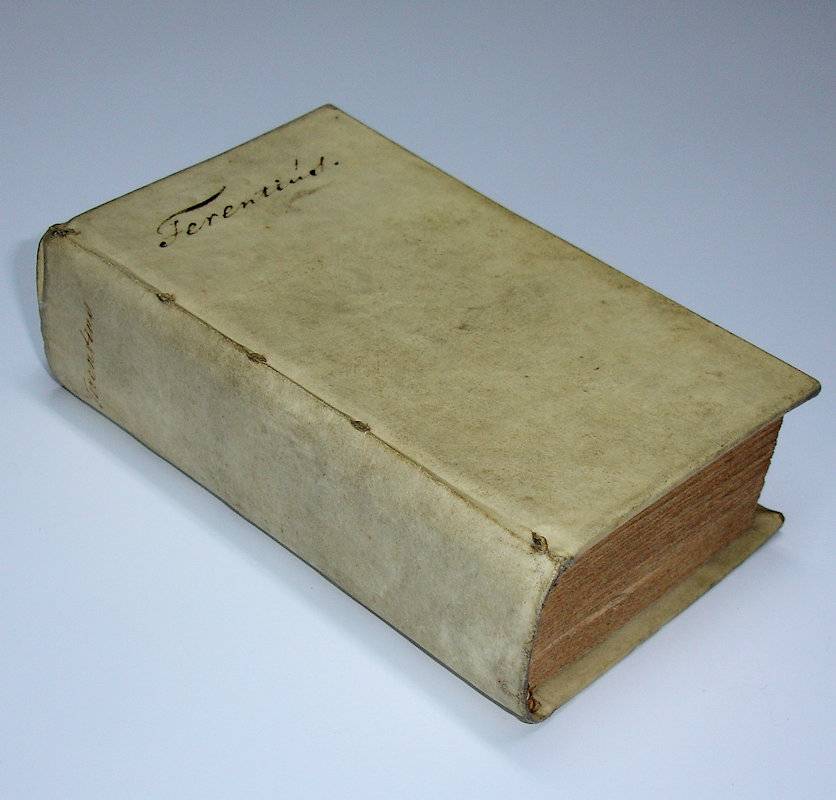TERENTIUS.
Publii Terentii Comoediae sex, ad optimas editiones nunc demum emendatae. Accedunt notae Joh. Min-Ellii, et index absolutissimus.
Amsterdam (Amstelaedami), Apud R. & G. Wetstenios, 1721.
12mo. (XVI, including frontispiece),540,(42 index),(2 blank) p. Vellum. 14.5 cm (
Ref: STCN ppn 30413497X; Schweiger 2,1067; Graesse 6/2,59) (
Details: Five thongs laced through both joints. The frontispiece, depicts a scene from one of the plays, the return of an abandoned child. Printer's device on the title: a burin being sharpened on a whetstone, around it the motto: 'Terar dum prosim') (
Condition: Terentius written in ink on both boards and on the spine. Some small and faint ink annotations (18th century)) (
Note: The late antique grammarian Aelius Donatus (4th century A.D) wrote not only a commentary on the plays of the Roman playwright Publius Terentius Afer, ca. 190-159 B.C., but also a short biography, in which he tells that Terentius was born in the Roman province Africa and that he came as a slave in the houshold of the senator Terentius Lucanus. He adopted his name when he was manumitted. Terentius is the author of 'fabulae palliatae', which means 'plays in Greek cloths'. He adapted Greek plays, especially those of the Greek playwright Menander, to the taste of the Romans. Six of his comedies have survived. For later generations he became a model for elegant Latin. His style was closer to everyday conversation than Plautus', an earlier contemporary comic playwright, whose style was more extravagant. He was quoted by Cicero, Horace, Persius and the Church Fathers.
§ Ever since antiquity Terentius lived also a long and influential life in schools as a model for Latin language and rhetoric. In the Middle Ages he was read for his moral sentences. He was imitated by the German abbess Hrotsvitha of Gandersheim (ca. 935 - ca. 973) in her 'Dramenbuch', with which she wanted to create a Christian alternative for the pagan comedies. With the coming of humanism Terentius enjoyed a renaissance in the classroom and on stage. Scholars rejected the 'barbaries' of Medieval Latin and chose the elegance of Cicero and Terentius as their model. They admired Terentius for his 'latinitas' and his civilized humour. In his 'De ratione studi'i (1511) the Dutch humanist Desiderius Erasmus, 1466-1536, encouraged the study of Terentius for his language and moral utility. 'Among Latin writers, who is more valuable as a standard of language than Terence? He is pure, concise, and closer to everyday speech and, by the very nature of his subject matter, is also congenial to youth'. (The Classical Tradition, 2010, p. 930). Erasmus' ideal as a humanist and pedagogue was the creation of better men with the help of the classics. He held the opinion, that schoolboys should read Terentius over and over again. Thus they could master a pure Latin style, and learn at the same time good morals.
§ One of the several 'Terentius for beginners', and a popular one too, was produced by the Dutch schoolmaster Johannes Min-Ellius, ca. 1625-1670. He was educated at the Erasmianum at Rotterdam, and was until his death a Praeceptor at the same school. Minellius, or Min-ellius, produced several school editions of classical authors, such as Horace, Florus, Vergil and Ovid, with ample annotations in easy Latin. His first school text of Terentius, with his numerous notes and commentary, was first published in 1670 in his hometown Rotterdam. At the end of the 17th and in the 18th century reissues of his Tererentius' schoolbook were widely used, not only on Dutch grammar schools, but also on German, English and Danish schools. Schweiger records editions in 1680 (Rotterdam), 1691 (Hamburg), 1691 (Cambridge), 1708 (London), 1710 (Leiden), 1721 (Leiden & Amsterdam), 1726 (Leipzig), 1730 (London), 1735 (Leipzig), 1741 (Copenhagen), 1757 (London), 1758 (London), 1771 (Copenhagen), 1775 (Madrid). There must be more unrecorded editions) (
Collation: pi1 (frontispiece), *8 (minus blank leaf *8); A-2A12, 2B4 (leaf 2B4 blank))
Book number: 120372 Euro 120.00
Keywords: (Oude Druk), (Rare Books), Komödie, Latin literature, Terence, Terentius, Terenz, antike altertum antiquity, comedy, römische Literatur
 TERENTIUS.
TERENTIUS.